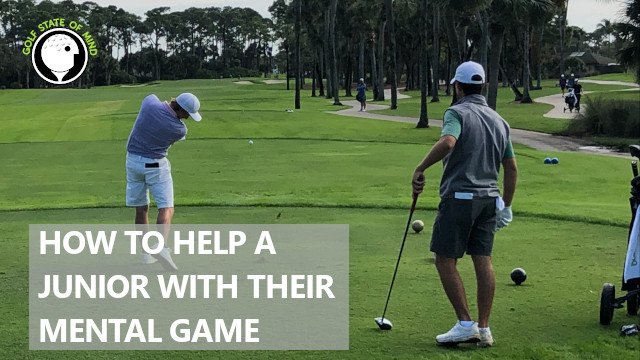
Helping A Junior Golfer With Their Mental Game
It’s never too early to begin helping a junior golfer with their mental game. Golf is a great game as it not only requires the development of technical skills, but to be successful requires the same mental skills that are required to be successful in anything in life – the ability to focus, self-awareness, having a “mastery” mindset, positive self-talk, strong body language and being able to handle pressure by managing negative thoughts, nerves and performance anxiety.
Where do we start with helping a junior golfer with their mental game?
Many juniors will be starting a busy season of junior golf tournaments. If you are a parent or coach of a junior golfer, here are a few things that you can do to help them succeed.
Ask Your Junior Golfer Good Questions
You can shape the mindset of a junior golfer everyday with the questions you ask and the tone you use to ask those questions. To help give your junior the freedom to access their best technical skills in tournaments, we need to foster a “Growth Mindset”, where they aren’t constantly judging themselves by their results. Try to ask questions in a way that takes focus away from the result and puts it more on what’s being learned. This way, they will see failure and mistakes in a different, more constructive, way instead of it being damaging to their ego and self-worth as a player. Developing a growth mindset takes time, but there’s no time like the present to start with it.
Golf is a long-term journey. The more your junior can learn from each performance and change behaviors and actions over time, the better they will perform in the long-term. Instead of criticizing and telling them what they did wrong, ask questions that will lead them to the answers for themselves.
Help Them Set Goals For The Round
Goals for a round should never be about score. It should be about effort towards the process and all the other mental game “success factors”. If they do well at those things, they give themselves the best chance of success. Your junior player will never have complete control over what they shoot in a round or the outcome of each shot. Trying to force a score or win, just adds pressure and creates frustration when there are setbacks. When they set goals for things that they have complete control over, it will take pressure off and increase focus on what they should be doing. Examples of these goals are:
- Pre Shot Routine
- Tempo In The Golf Swing
- Body language
- Acceptance
- Self-talk
The Mental Game Scorecard is a big part of my mental coaching process and it can be used to make any player more aware of what they are doing in a round and keep them accountable to their “process”, instead of focusing only on their score.
So instead of saying “I think you’re going to win today” or “I think you can shoot in the 70’s today”, avoid contributing to expectations of their performance. Help them set goals for their attitude, focus, breathing etc, and reward them if they can do it. Rewarding process is a much better way to help a junior play better in tournaments, than rewarding the result.
Review A Round With Less Emotion And More Objectivity
In the same way that your junior golfer will have to learn how to deal with a good and bad outcomes in tournaments, it’s important that you show them the responses that you would like them to have. I.e. less judgement and more objectivity.
We have to be aware of our reactions to their play. All juniors seek approval from their parents and coaches. If all we focus on is the result and we react one way when it’s a low number and another when it’s a higher number, the junior will feel more pressure to go out there and shoot low scores (to make you happy), which will add pressure and make it harder to deal with mistakes.
Try to stay neutral when it comes to the result. Whatever the score, ask your junior to highlight as many positives as they can about the round, and celebrate their successes with them (good for self-esteem and for being more optimistic). Next ask the important question of what they learned and how they can use the experience to become a better player. How did they do with their Mental Game Scorecard and what would they do differently next time? Be objective, not emotional. Ask them what specific actions they can take to get better. If they were unhappy about the round, create a plan for improvement. All my students use a “Performance Journal” to to write down their reflections from a round (which they share with me).
Managing Emotions and Performance Anxiety
Does your junior go through a roller coaster of emotions during every round? Do they find it hard to deal with set-backs and then start doubting themselves? Many juniors play well until that bad shot or high score on a hole occurs, and after that, their confidence drops and the negative self-talk and doubt begins.
Bad shots and an occasional high number on a hole is part of the game. What’s more important is how the player deals with them. We need to make the player aware of how they are reacting to the emotions they are experiencing and train them to not let those emotions trigger negative self-talk and doubt.
It’s hard for parents to play the role of coach as well, and in most cases, they respond better to a neutral party. If you feel like your junior could benefit from mental coaching, please book a free one on one phone consultation by clicking here.


